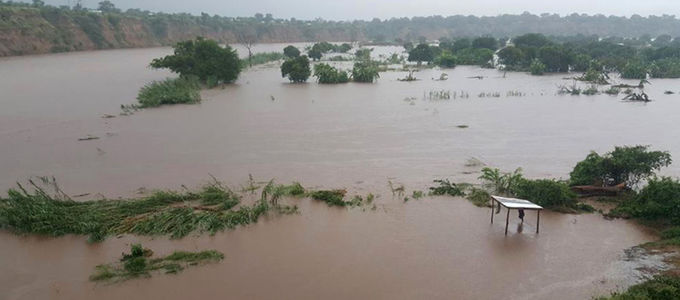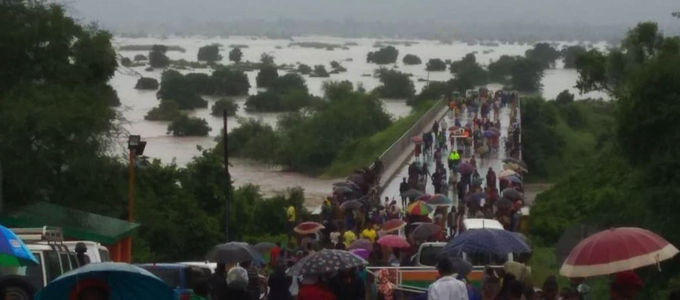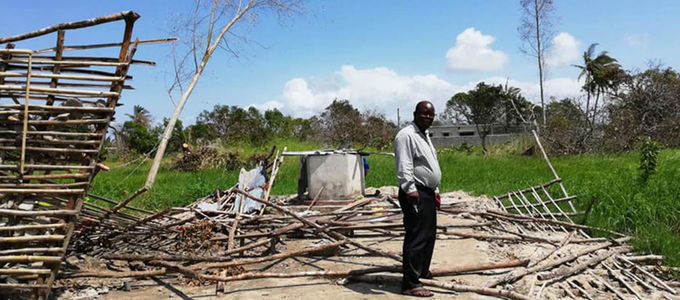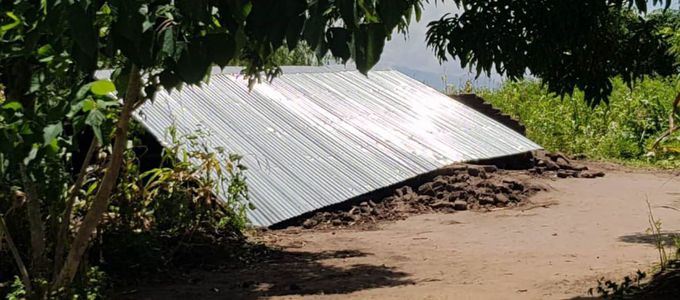
Blue skies and green meadows … A holiday photo? Far from it. Until recently there was still a village here. “There is devastation everywhere,” Bishop Alwin Witten says. The New Apostolic Church Southern Africa dispatched him to Beira for a week.
Beira is the big port in Mozambique with a population of half a million people where Cyclone Idai made landfall in March. The cyclone swept across the country at speeds of up to 200 kilometres per hour, bringing days of heavy winds and rain. It left a devastating trail of destruction as it crashed through Malawi, then Mozambique, and finally Zimbabwe.
There is no end to the people’s plight
Situation report is the name of the newsletter issued by UN OCHA, the United Nations Office for the Co-ordination of Humanitarian Affairs. With respect to Malawi and Zimbabwe it has become rather quiet. But from Mozambique there are still daily news updates.
The cyclone claimed more than 600 lives. Nearly 240,000 houses were destroyed or heavily damaged. Well over 160,000 people live in more than 160 collective emergency shelters. The lack of clean and safe drinking water is the biggest risk and has caused the outbreak of disease. Nearly 3,600 cases have been reported.
And there is still no end in sight. Even three weeks after the flood, entire regions are still under water. And the annual rainy season has just started.
Helpers are optimistic
However, there is also good news. Big relief organisations like the Red Cross are in Mozambique and providing emergency aid. Well over 750,000 people are receiving food assistance. And nearly as many people have received an oral cholera vaccination. Meanwhile, the distribution of seeds for the winter harvest has begun so that people can begin to grow crops again on the fields that were destroyed by the cyclone.
“It is great to see how the relief organisations work together here,” Bishop Witten reports from his working area in Mozambique. The New Apostolic Church in the country is comprised of nearly 190,000 members, organised in eleven Apostle districts. The region that Apostle Agostinho Dzimba works in, where he looks after 43 congregations, was the hardest hit by the flood. Eight churches have been completely destroyed, many others have been damaged.
A step-by-step rebuilding process
How do people in Mozambique deal with all the hardship? “They have never had much and are used to hardship,” Bishop Witten says. “They do what they have to do in order to get on with their lives. They roll up their sleeves and start with rebuilding their lives.” And this is what the New Apostolic Church Southern Africa wants to support through its relief organisation Masakhe.
After the reports of the flooding caused by the cyclone, Church members had expressed the desire to help the people in Mozambique. Masakhe Foundation responded with a fundraising campaign. The money will go towards the reconstruction of schools. “In the middle of all this chaos, you see the children standing there in their school uniforms, wanting to go to school: but the school is gone,” says Bishop Witten, referring to a situation that touched him particularly.
Relief efforts in full swing
For the school reconstruction project a co-operation with NAK-karitativ is being discussed. While the German charity is already thinking about reconstruction in Mozambique, emergency aid in Malawi and Zimbabwe is still running at full capacity. This is what the project coordinator, Joana von Jarmersted, reports.
Some 15,000 people were provided with emergency aid kits containing food, blankets, tarpaulins, and chlorine tablets to prevent water-borne diseases. The kits also included pens and notebooks for the children. Another focus area is southern Malawi. A health kit is being sent there by air, which will provide painkillers, antibiotics, bandages, and nutritional supplements for a thousand people for three months.
This is a joint project which NAK-karitativ is working on together with the New Apostolic Church Relief Organisation (NACRO) and an organisation called Help e.V. – Hilfe zur Selbsthilfe. NAK-karitativ not only receives financial support for this from an ongoing fundraising campaign, but also received a 50,000-euro donation from the New Apostolic sister organisation human aktiv in Southern Germany. And NAK Humanitas from Switzerland joined the ranks of the helpers by sending 30,000 Swiss francs directly to the Red Cross




















